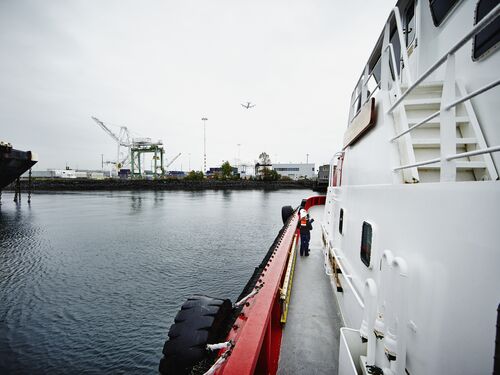World’s Largest Gathering of Transportation Research Professionals; Transportation Research Board Celebrates Centennial
News Release
By Paul Mackie and Andrew Robinson
Last update January 5, 2021
WASHINGTON — Industry leaders, policymakers, administrators, and researchers from government, industry, and academia will gather online for the Transportation Research Board’s 100th Annual Meeting, taking place virtually throughout January 2021. Committee meetings will take place Jan. 5-8 and Jan. 11-15, while sessions and exhibits will be held Jan. 21-22 and Jan. 25-29.
This year’s spotlight theme is “Launching a New Century of Mobility and Quality of Life.” More than 350 sessions and workshops will cover all transportation modes. Of these, more than 40 sessions will touch on how COVID-19 has impacted transportation and how transportation professionals and researchers are responding.
Panel sessions and special events include:
Chair’s Plenary Session
The Chair’s Plenary Session will feature keynote speaker Marcia McNutt, president of the National Academy of Sciences. McNutt will discuss the National Academies’ strategic plan and important future issues in science related to transportation, in addition to the importance of envisioning a future of sustainable transportation that provides accessibility for everyone.
Wednesday, Jan. 27, 11:30 a.m. to 1:30 p.m. EST
Thomas B. Deen Distinguished Lecture
This year’s lecture, titled “Our Work Is Never Done: Examining Equity Impacts in Public Transportation,” will be given by Dorval R. Carter Jr., president of the Chicago Transit Authority, the nation’s second largest transit agency. Carter is recognized for his leadership in the transit industry and legal community, and for spearheading significant advances to public transportation. Former U.S. DOT Secretary Anthony Foxx will participate in a post lecture discussion.
Monday, Jan. 25, 5:30 p.m. to 6:45 p.m. EST
Sessions With State Department of Transportation Officials
State DOT CEO Roundtable
Monday, Jan. 25, 1 p.m. to 2:30 p.m. EST
CEO Responses to Major Events: An Opportunity for Innovation
Disruptive events over the past year have come in many forms, from the COVID-19 pandemic to devastating weather events to large protests calling for social equity. Transportation systems across all modes have been taxed by operational interruptions, funding uncertainty, and infrastructure impacts. In addition to the stresses placed on systems have been the considerable impacts on the people these agencies employ and transport. In this session, CEOs will share their experiences with the internal and external challenges they have faced, and will talk about the innovations they have employed to navigate through these crises to make lasting improvements to their organizations.
Monday, Jan. 25, 4 p.m. to 5:30 p.m. EST
Embracing the Future: The Journey to Transportation in 2070
What will the transportation system look like in 2070? What path should the transportation profession follow in the coming half-century to reach a desirable outcome? And what actions should transportation professionals be taking right now to move society toward that outcome? This session explores these questions with panelists who contributed to a TR News special issue on “Embracing the Future,” prepared as part of the TRB Centennial Celebration. The articles in that issue draw upon the past 100 years of transportation history to ground their vision of the coming five decades. The discussion will focus on safety, climate change and resiliency, infrastructure, transformative technology, and the form of the street.
Tuesday, Jan. 26, 4 p.m. to 5:30 p.m. EST
Sessions With U.S. Department of Transportation Officials
Winter Maintenance Technology and Innovation in Practice
Cutting-edge practices, materials, equipment, and information technologies are always finding their way into the daily operations of winter maintenance professionals around the world. The panelists represent agencies that are trying some of the newest technology. They will feature what they are doing, their motivation, and how they are able to turn research into practice.
Monday, Jan. 25, 1 p.m. to 2:30 p.m. EST
FHWA Leadership in Innovation
The panel discussion will focus on the project- and leadership-level transformations that occurred over the past several months. On the project side, panelists will discuss how federal, state, and local agencies quickly made adaptations to project development and delivery to ensure they could continue in a virtual state of practice. From the leadership perspective, panelists will discuss the changes they made to ensure their workforce stayed informed, cared for, and productive; and their missions stayed intact during these atypical times.
Thursday, Jan. 28, 10 a.m. to 11:30 a.m. EST
Sessions Focusing on the Effects of the COVID-19 Pandemic
The Future of Travel in a Post-COVID-19 Pandemic World
While telecommuting and tele-activities have been around for decades, they have failed to have a noticeable impact on vehicle miles traveled and congestion. Then, the COVID-19 pandemic brought huge disruption to society — causing a sharp increase in telework, telehealth, e-learning, e-shopping, and uncertain impacts on travel demand and mobility solutions. Speakers and a discussion panel will share research highlights and different perspectives on what the future might hold.
Thursday, Jan. 21, 2 p.m. to 5 p.m. EST
Impacts of COVID-19 on Decarbonization of Transportation
As various countries imposed unprecedented lockdowns to combat COVID-19, and travel plummeted worldwide, an unintended consequence emerged in the form of significant declines in transport-related emissions. This session will explore the dynamic changes to people’s travel behavior, the impact of these changes to transport decarbonization, and whether these changes are here to stay post COVID-19 as countries and economies re-open.
Monday, Jan. 25, 10 a.m. to 11:30 a.m. EST
Planning for Transit in a Post-Pandemic Future
The COVID-19 pandemic has had a tremendous impact on the public transportation industry, affecting everything from operations to ridership to financial stability. Although the industry has shown substantial resilience in responding to the pandemic in the short term, the longer-term effects must also be considered. This session will look at how agencies are planning for an uncertain future.
Tuesday, Jan. 26, 1 p.m. to 2:30 p.m. EST
Attendees can download the free annual meeting app to access information on the schedule of events, program participants, exhibitors, and more. To download, search for “TRB 2021” in the App Store or Google Play. To follow online conversations about the annual meeting, use the hashtag #TRBAM and follow TRB on Twitter @NASEMTRB.
A virtual newsroom will be available to reporters in the Virtual Exhibit Hall at the TRB Communications/Media Booth. Members of the media must register for access to the meeting; contact Paul Mackie (information below). More about the meeting schedule, including an interactive program and curated sessions for attendees with specific interests, is available online.
TRB is a program unit of the National Academies of Sciences, Engineering, and Medicine — private, nonprofit institutions that provide independent, objective analysis and advice to the nation to solve complex problems and inform public policy decisions related to science, technology, and medicine. The Academies operate under an 1863 congressional charter to the National Academy of Sciences, signed by President Lincoln.
Contacts:
Paul Mackie, Director of Communications/Media
Transportation Research Board
202-334-2378; e-mail PMackie@nas.edu
Andrew Robinson, Media Relations Associate
Office of News and Public Information
202-334-2138; e-mail news@nas.edu
More like this
Events
Right Now & Next Up
Stay in the loop with can’t-miss sessions, live events, and activities happening over the next two days.
NAS Building Guided Tours Available!
Participate in a one-hour guided tour of the historic National Academy of Sciences building, highlighting its distinctive architecture, renowned artwork, and the intersection of art, science, and culture.


